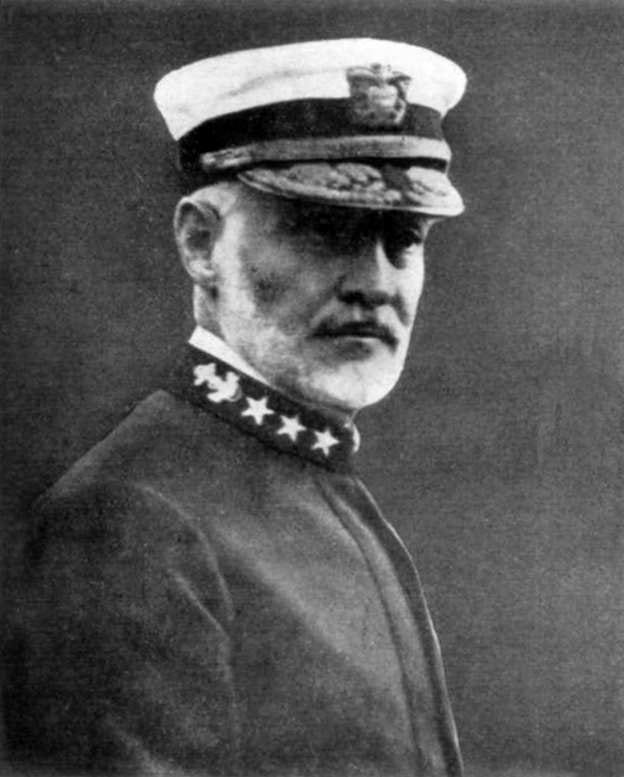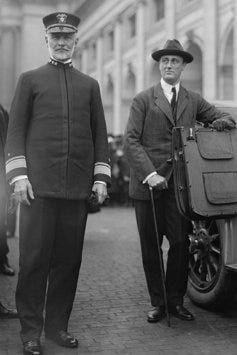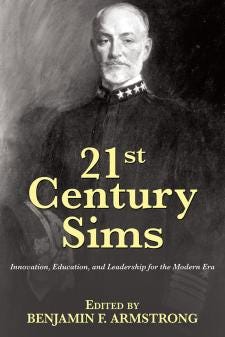BJ Armstrong
In early 1916, Europe was engulfed in The Great War. The rapid campaign expected in the summer of 1914 had degenerated into something unexpected, a long and almost siege-like struggle. While the United States proclaimed neutrality, the U.S. Navy suspected things would get worse and they would eventually either need to protect the American coast, or carry an army across the Atlantic after a mass mobilization. They began to prepare a group of volunteers who expressed interest in joining the naval services. It began with a series of lectures, including subjects like coastal defense tactics and torpedo boats, and a short period aboard a ship at sea.
 Captain William Sims was asked to prepare a lecture for the Naval Volunteers on the subject of “military character.” Sims was well known in the service. He had ledthe gunnery revolution a decade prior, at one point earning him the nickname “The Gun Doctor”. He was also a leading voice in the development of modern battleships. He had spent some time at the Naval War College as a student, and was kept on as an instructor before returning to the fleet. During the war he would command all U.S. Naval Forces in Europe, the Navy’s command equivalent to General Pershing’s on land.
Captain William Sims was asked to prepare a lecture for the Naval Volunteers on the subject of “military character.” Sims was well known in the service. He had ledthe gunnery revolution a decade prior, at one point earning him the nickname “The Gun Doctor”. He was also a leading voice in the development of modern battleships. He had spent some time at the Naval War College as a student, and was kept on as an instructor before returning to the fleet. During the war he would command all U.S. Naval Forces in Europe, the Navy’s command equivalent to General Pershing’s on land.
The subject of professionalism is central to much of Sims’ writing, both before the war and after returning home to assume responsibilities as the President of the War College. From the importance of personal professional study to the elements of mission command to the need for constant military innovation, he spent a good deal of time thinking about the subject.
…a central but often overlooked element was the importance of self-awareness. Professionalism requires a constant personal net assessment, or “estimate of the situation.”
What did Sims believe were the professional and ethical responsibilities of a military leader? In his view a central but often overlooked element was the importance of self-awareness. Professionalism requires a constant personal net assessment, or “estimate of the situation.” This is what he told the Naval Volunteers who had gathered with the knowledge that they might soon leave their civilian lives and take on the mantle of military leadership:
It seems almost incredible that there should be men of marked intellectual capacity, extensive professional knowledge and experience, energy and professional enthusiasm, who have been a detriment to the service in every position they have occupied. They are the so-called “impossible” men who have left throughout their careers a trail of discontent and insubordination; all because of their ignorance of, or neglect of, one or many of the essential attributes of military character.
I knew one such officer who was a polished gentleman in all respects, except that he failed to treat his enlisted subordinates with respect. His habitual manner to them was calmly sarcastic and mildly contemptuous, and sometimes quite insulting, and in consequence he failed utterly to inspire their loyalty to the organization.
A very distinguished officer said after reaching the retired list: “The mistake of my career was that I did not treat young officers with respect, and subsequently they were the means of defeating my dearest ambitions.”
The services of this officer, in spite of this defect, and by reason of his great ability, energy, and professional attainment, and devotion to the service, were nevertheless of great value.
Both qualities and defects of course exist in varying degrees. These sometimes counterbalance each other, and sometimes the value of certain qualities makes up for the absence of others.
…no matter what other qualities an officer may possess, such success can never be achieved if he fails in justice, consideration, sympathy, and tact in his relations with his subordinates.
Some officers of ordinary capacity and attainments have always been successful because of their ability to inspire the complete and enthusiastic loyalty of all serving with them, and thus command their best endeavors; but no matter what other qualities an officer may possess, such success can never be achieved if he fails in justice, consideration, sympathy, and tact in his relations with his subordinates.
 Such men are invaluable in the training of the personnel of a military organization in cheerful obedience, loyalty and initiative; and when these qualities are combined in a man of naturally strong character and intellectual capacity he has the very foundation stones upon which to build the military character.
Such men are invaluable in the training of the personnel of a military organization in cheerful obedience, loyalty and initiative; and when these qualities are combined in a man of naturally strong character and intellectual capacity he has the very foundation stones upon which to build the military character.
The pity of it is that so many men of great potential power should not only have ruined their own careers, but have actually inflicted continuous injury upon the service, through neglecting to make an estimate of the situation as regards their characters and through neglecting to use their brains to determine the qualities and line of conduct essential to success in handling their men, and thus failing to reach a decision which their force of character would have enabled them to adhere to.
Such a reasoned process applied to the most important attribute of an officer, namely, his military character, would have saved many from partial or complete failure through the unreasoned, though conscientious, conviction that it was actually their duty to maintain an inflexible rigidity of manner toward their subordinates, to avoid any display of personal sympathy, to rule them exclusively by the fear of undiscriminating severity in the application of maximum punishments, and such like obsessions.
It would appear that such officers go through their whole career actually guided by a snap judgment, or a phrase, borrowed from some older officer…Though they have plenty of brains and mean well, their mistake is that they never have subjected themselves and their official conduct to any logical analysis.
It would appear that such officers go through their whole career actually guided by a snap judgment, or a phrase, borrowed from some older officer, such as the precepts quoted above. Though they have plenty of brains and mean well, their mistake is that they never have subjected themselves and their official conduct to any logical analysis. Moreover, they are usually entirely self-satisfied, and frequently boastful of their unreasoned methods of discipline; and they usually explain their lack of success by inveighing against the quality of the personnel committed to their charge.
All this to accentuate the conclusion of the war college conference that: “We believe it is the duty of every officer to study his own character that he may improve it, and to study the characters of his associates that he may act more efficiently in his relation with them.”
 This, then, is the lesson for all members of our military services. Let us consider seriously this matter of military character, especially our own. Let us not allow anybody to persuade us that it is a “high brow” subject, for though military writers confine their analysis almost exclusively to the question of the “great leaders,” the principles apply equally to all individuals of an organization from the newest recruit up.
This, then, is the lesson for all members of our military services. Let us consider seriously this matter of military character, especially our own. Let us not allow anybody to persuade us that it is a “high brow” subject, for though military writers confine their analysis almost exclusively to the question of the “great leaders,” the principles apply equally to all individuals of an organization from the newest recruit up.
Reprinted by permission of The Naval Institute Press, from Benjamin Armstrong, Editor, “21st Century Sims: Innovation, Education, and Leadership for the Modern Era” (Annapolis, MD: Naval Institute Press, 2015). The book, where you can find much more of William Sims writings on the professional ethic, is available 15 February 2015 in paperback and e-book.
No comments:
Post a Comment